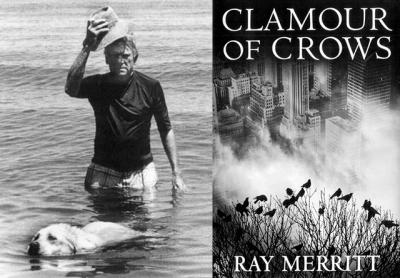Masters of the Dark Arts

“Clamour of Crows”
Ray Merritt
Permanent Press, $29.95
There may be a murder at the heart of Ray Merritt’s first novel, “Clamour of Crows” — it’s hard to get published without one these days — but what’s really of interest is the author’s exploration of the culture of a Wall Street law firm, the fading clubbiness, the ascendant multiethnic meritocracy, and always the cutthroat competition and ingrained sexism.
We’re talking Big Law here, “the twenty-first-century term,” Jonathan (Tuck) Tucker tells us in his first-person narration, “for white shoe Wall Street large-firm practice. That was a more appropriate handle.” But gone is not only the prep and Ivy school WASP homogeneity, the major firms aren’t even on Wall Street anymore, having moved uptown.
The reader might be generally aware of that line of work’s tough cost-benefit realities, its tendency to chew up and spit out 9 out of 10 of the best and brightest hires within a decade or so, despite entry-level salaries nearing 200 grand, as Tuck points out, but nonetheless his world-weary running commentary is often fascinating — the way those firms were spoiled by hard-charging baby boomers, for instance, while the millennials and “the whatevers” bring an expectation of inclusion into a resolutely hierarchical workplace, along with the baggage of “their personal passions,” thus complicating the institutional expectation that they become “pantry maids and foot soldiers” in the name of the firm.
It’s enough to make a nickel-and-dimer’s heart swell.
Tuck, our guide through a thicket of depositions and greedy third parties and a rich man’s contested will, wielding a verbal machete against tangles of corporate divisions and the attendant drones, hangers-on, and henchmen, all the while negotiating the convoluted family flow chart of a staunch advocate of polyamory, is a self-described “dysfunctional widower and career griever,” his wife and two children having died in a car wreck on the Long Island Expressway.
But at least he’s sympathetic and clear-eyed. Having been temporarily lured back into a life with the big firm, he dutifully assembles an investigative team — at the forefront a couple of young associates, Drew, a Bohemian-chic kinda gal with a ready laugh, and Dixie, a gay former football standout at Yale who hails from the Redneck Riviera. Their bull sessions recall scenes from “The Paper Chase,” what with their reports (“What have you learned?”), occasionally Socratic questioning, interviews with the ensnared or the conniving, and always Tuck leading them back to the central point, or points, the mystery of the great man’s death and the myriad suspects. This he often does with a reader-friendly and, given the sheer number of characters, quite necessary “Let’s go over what we know” summation.
The deceased is Ben Baum, an electronics retail magnate whose company unwisely ventured into the dark territory of quasi-military security operations, a la the infamous Blackwater. He’s a fellow who would surreptitiously have his autistic son sterilized to prevent unfit progeny, but before you think too ill of him, he’s also something of an imaginative fabulist devoted to the works of J.R.R. Tolkien. His precatory letter, ostensibly a statement of his wishes written with one foot in the grave, is more of an upturned middle finger of a word puzzle partially composed in the runes of the language Tolkien invented for Bilbo Baggins.
Baum, children’s literature — that’s right, he’s descended from L. Frank Baum, the author of the Oz series, and so the question becomes just who is that man behind the curtain.
Let’s pull back our own curtain a bit, shall we? A difficulty in reviewing a plot-driven book like this is that if you’re not a fan of summarization, if in fact you avoid it as much as you do revealing spoilers, then where are you?
Perhaps back with likable Tuck. Here’s a glimpse: “I have a set formula for selecting my attire. Shirt from the top of the pile, shorts with the most elastic, trousers with remnants of a crease, shoes with a semblance of polish. Then I top that off with the sweater with the least lint balls and the jacket with the fewest dog hairs. Finally, double-checking that the socks are a close match, I am ready to roll.”
Humility will get you everywhere.
Ray Merritt’s previous books include “Full of Grace: A Journey Through the History of Childhood.” A former corporate lawyer, he lives on North Haven.
